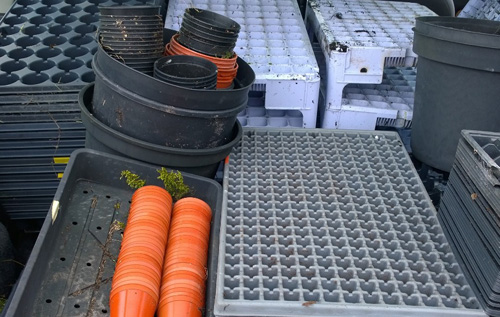A new community market garden has been established near Reepham. Eves Hill Veg Co is a co-operative venture located on a two-acre triangle of land next to the Eves Hill Farm campsite on Norwich Road, Booton.

The not-for-profit social enterprise aims to grow fresh, ecological, local produce at affordable prices. It is now looking for volunteers to help get the site established and learn about vegetable growing.
Hannah Claxton, who has been involved in setting up the enterprise, said this year’s aim is to get the site up and running and begin to see what vegetables and in what quantities it can grow.
“We also want to find out who is interested in getting involved in this project or becoming a customer,” she added.
Eves Hill Veg Co will be running volunteer days on Wednesdays from 11 am – 1 pm (if you want to get involved, please make contact first).
In March, the volunteers will be doing basic carpentry, such as building self-watering propagation tables, and putting up a polytunnel; in April there will be seed sowing; and in May planting out and weeding and hoeing.
Miss Claxton grew up in Booton and has returned after 20 years to start this new social enterprise.
The project was initiated at the invitation of Jeremy Buxton, another Norfolk returnee, who has set up a beef box scheme with his heritage Hereford cattle and a campsite at the Buxton family farm.
Miss Claxton has a background in the music industry as a business manager, and for the past seven years has been involved in organic farming and community food.
She spent three years working with Organiclea Community Growers in northeast London, a workers’ co-operative with 12 acres of land that now employs 17 people and 20 sessional workers.
She still returns to Organiclea weekly to teach City and Guilds in horticulture with specialism in vegetable and fruit production using organic methods.
- For more information about the project or to come and volunteer, email: hannahclaxton@googlemail.com
Not for profit
We would like to turn a profit in years to come, but any money we do make will go into creating jobs and livelihoods and supporting others to learn to grow or start their own food growing enterprises.
For now we are applying for social enterprise start-up funds and would like to fundraise to run specific participation programmes, for example, for teenagers interested in agriculture or those at risk of isolation.
Community food
In farming today, the cost of food production and running a farm is much higher than the income you get from global grain markets or supermarket contracts.
Supermarkets know it is cheaper to import from the Netherlands, Russia or Kenya, and either move their business there or use these lower prices to push down the value of contracts.
We are seeing more and more farmers and horticulturalists no longer wanting or being able to make a living from food production and turning to other non-food producing businesses or retiring and renting out their land.
Community food aims to bring food production back to the local, creating jobs and direct relationships with customers. By cutting out supermarkets and working together, we aim to provide the freshest of produce locally at reasonable prices.
Over time Eves Hill Veg Co would like to become a community benefit company owned by the community and run by its workers. We want to see rural countryside benefiting the local economy, starting with Reepham.
Ecologically grown
Around 25% of carbon dioxide emissions come from our food system. By reducing the miles our produce travels and cutting out the use of chemical sprays we can all do our bit against climate change.
Ecologically grown also means promoting biodiversity above and below the soil; encouraging soil life (which also sequesters and stores carbon away from the atmosphere), beneficial insects and pollinators, birds and small animals – establishing a food web that promotes sustainable ecosystems on a small-land scale.
We build fertility in our soils using compost and animal manure, and by growing plants called “green manures”, which hold on to nutrients from the soil and air, bring nutrients up from deep down, otherwise known as “fixers, moppers and lifters”.

